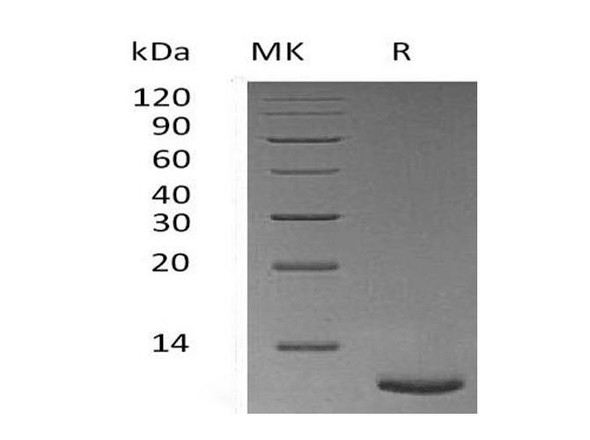| Sequence: | Met1-Phe80 |
| Accession: | Q07654 |
| Storage: | Generally, lyophilized proteins are stable for up to 12 months when stored at -20 to -80°C. Reconstituted protein solution can be stored at 4-8°C for 2-7 days. Aliquots of reconstituted samples are stable at < -20°C for 3 months. |
| Shipping: | This product is provided as lyophilized powder which is shipped with ice packs. |
| Formulation: | Lyophilized from sterile PBS, pH 7.4. Normally 5 % - 8 % trehalose, mannitol and 0.01% Tween80 are added as protectants before lyophilization. Please refer to the specific buffer information in the printed manual. |
| Reconstitution: | Please refer to the printed manual for detailed information. |
| Background: | Trefoil Factor 3 (TFF3), also known as Intestinal Trefoil Factor (ITF) and P1.B, is one of three structurally related secreted proteins that contain trefoil domains. These domains adopt a three-leaved conformation held together by conserved intrachain disulfide bonds. TFF3 is an approximately 7 kDa peptide that plays an important role in epithelial regeneration and wound healing. It can form disulfide-linked dimers or associate into disulfide-linked complexes with the intestinal mucous proteins FCGBP and MUC-2. TFF3 is expressed by epithelial goblet cells in the respiratory tract, biliary and breast ducts, small and large intestine, and cardia of the stomach. Following secretion, TFF3 can be retained in the overlying mucous layer. TFF3 is also expressed by chondrocytes during bone development. Mature human TFF3 shares 76% amino acid sequence identity with mouse and rat TFF3. TFF3 is up-regulated in response to a range of gastrointestinal epithelial disruptions. It promotes epithelial wound healing by inducing the migration of biliary, bronchial, and intestinal epithelial cells. TFF3 up-regulation is associated with and enhances tumor cell invasion and metastasis. It supports hypoxia-induced VEGF up-regulation in tumor cells and also promotes angiogenesis in non-tumor environments. Over-expression of TFF3 in type 2 diabetic mouse liver has been shown to improve glucose tolerance and insulin sensitivity. |






